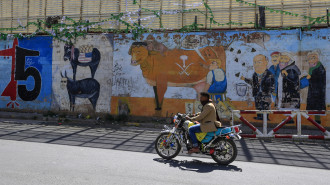No Funeral For Nazia: Taha Kehar’s new novel is set during an unconventional grieving party
“I used to tell my siblings that when I die, I want a boat party – and that I’d want specific people to be on that boat,” author Taha Kehar tells me. It may have been a somewhat naïve request spoken in jest, but Taha has just written a novel centred on this very premise.
No Funeral for Nazia, published by Neem Tree Press, releases on October 19. It follows the story of Nazia, a Pakistani woman in her 40s who dies suddenly, and in her diary, requests that her sister arrange a party, instead of a funeral.
"Death can be a morbid topic, but the party that he envisions serves purposes beyond mourning, as readers witness relationships that both break down and patch up when shocking truths come to light"
She plans for the attendees to undergo hypnotherapy to release the negative feelings they harbour towards her and heal themselves too, in the process.
Nazia lists the six people to be included at the party – her sister Noureen and her husband Asfand, her daughter Sabeen, her friend-turned-nemesis Parveen, her publisher Dolly and her husband Fardeen, and her ex-husband Saleem.
“Do you realise how awkward this party is going to get?”
It’s a question Asfand asks Noureen when she reveals her plans to follow her sister’s dying wishes. Awkward it is indeed, as it looks like Asfand – and the other characters – all have secrets they are hiding. Each has their own reason for feeling bitter towards Nazia, and while hypnotised, they relive their pivotal memories with the deceased.
As they do, details regarding marriages, friendships and secret trysts are brought to the surface, revealing a somewhat incestuous web of relationships, replete with betrayal, treachery and long-held grudges. As the night goes on, one thing becomes increasingly clear – many of these characters carry a years-long obsession with Nazia, and her death has left a deep void in their lives.
|
While readers never meet a living Nazia, they become intimately acquainted with her through these six characters’ memories. Over the course of the story, she is described as a “sly beast”, “eccentric”, “flirtatious”, “reckless”, “daring”, “carefree”, “audacious” and “intriguing.”
Taha’s first novel, Typically Tania, was written in the first-person narrative and he says that with No Funeral for Nazia, he wanted to play with multi-narrative perspectives. He describes the narrative as one that is “women-driven” – Nazia has dictated the terms in which she shall be remembered and grieved. He was in part inspired by the classic gothic novel, Rebecca, where the main character is a “silence” and an “absence.”
“I wanted to see what one could achieve with that,” he explains. “If other people are your narrators, can they really understand you?”
Each of them is beginning their own process of grieving for Nazia, a woman they have strong – and mixed – feelings for. “We don’t really speak about grief and death, as a society, and I was thinking about alternative ways of grieving,” says Taha. Around a year and a half after he completed his first draft of the novel, his own mother passed away, and Taha found himself dealing with grief. “Contemplating the idea of death and grieving helped me grieve my mother in a way – you just have to let go and accept certain things,” he says.
In the fictional No Funeral For Nazia, it is through the process of hypnotherapy that Taha’s characters confront their demons, and work to absolve their hearts of the ill feelings they have towards his central character. “We have this flawed notion that hypnotism is all about magic tricks,” says Taha, who spoke to psychotherapists to help gain an understanding of the process and its effects.
"This isn’t simply a salacious story about affairs and scandals. It’s a layered, piecing-together of a woman through the perspectives of those who loved – and hated– her; a woman whose parting gift to them all is the opportunity to heal themselves"
Even in her grave, Nazia is running the show, urging her loved ones to undergo hypnotism as a final request. The overall reaction is one of scepticism – which she evidently anticipated. Through instructions in her diary, she entices each of the characters with an envelope that contains a portion of her inheritance, which they will receive after their session.
“I wanted to see what I could do with people who were averse to any form of therapy and it’s interesting because there are men and women, and they have different reactions and approaches to it,” says Taha, acknowledging that mental health in general is still stigmatised in South Asian society. “It’s something we don’t really speak about so often, and for older generations, mental health isn’t regarded as a necessity.”
|
Most of the novel takes place over the course of the party, and while Taha uses this setting to lift the lid on topics like mental health, grief and therapy, he does so in a way that’s entertaining – even humorous, in some instances.
Death can be a morbid topic, but the party that he envisions serves purposes beyond mourning, as readers witness relationships that both break down and patch up when shocking truths come to light.
Yet, this isn’t simply a salacious story about affairs and scandals. It’s a layered, piecing-together of a woman through the perspectives of those who loved – and hated– her; a woman whose parting gift to them all is the opportunity to heal themselves.
Taha’s writing style, laced with colourful metaphors and discerning remarks about society, makes the novel a delight to devour. On the first page, he describes a sprawling bougainvillaea plant in the garden as “a riot of hot pink against the azure Karachi sky”. Elsewhere, he writes, “In a country where the very weather had become an existential threat, few had the opportunity apparently, of pausing to consider their mental health.”
Karachi is home for Taha, who besides authoring Typically Tania, also co-edited an anthology titled The Stained Glass Window: Stories of the Pandemic from Pakistan.
In No Funeral for Nazia, which is Taha’s first UK-published book, sentences are peppered with Urdu words, Pakistani fashion designer names like Sana Safinaz, Elan and Bunto Kazmi are dropped here and there, and conversations revolve around politics – from the parties in power to the declining currency value of the Pakistani rupee.
Some of these details may go over the heads of readers who aren’t well-versed with contemporary Pakistani culture, but a glossary at the end of the book educates non-Urdu-speaking readers about some of the terms and traditions described in the story, including traditional Muslim burial rituals.
It all makes for an incredibly scintillating read. Yet, despite Taha’s initial reverie of having a boat party instead of a funeral, he admits he would prefer beginning his own journey to the afterlife, the traditional way. “At the end of the day, I would prefer having those conventional rituals surrounding death,” he says. “They can be quite stifling for some but personally, I find comfort in them.”
Hafsa Lodi is an American-Muslim journalist who has been covering fashion and culture in the Middle East for more than a decade. Her work has appeared in The Independent, Refinery29, Business Insider, Teen Vogue, Vogue Arabia, The National, Luxury, Mojeh, Grazia Middle East, GQ Middle East, gal-dem and more. Hafsa’s debut non-fiction book Modesty: A Fashion Paradox, was launched at the 2020 Emirates Airline Festival of Literature
Follow her on Twitter: @HafsaLodi







 Follow the Middle East's top stories in English at The New Arab on Google News
Follow the Middle East's top stories in English at The New Arab on Google News


